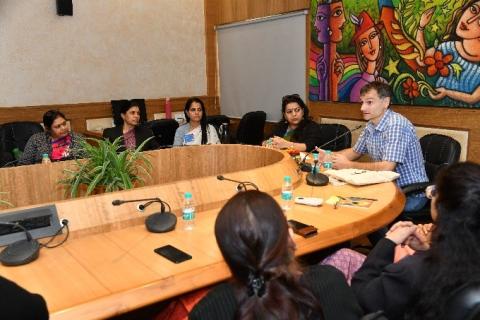Addressing and Meeting Global Needs through the Humanities & Social Sciences Curricula

The School of Humanities, IIS (Deemed to be University) organized an Enrichment Session on the topic “Addressing and Meeting Global Needs through the Humanities & Social Sciences Curricula”, by Prof. Alsier Altuna Garcia de Salazar, University of Deusto, Bilbao (Spain) for the faculty members from School of Humanities and School of Social Sciences on 2 Dec.’23 from 2:00-3:30 pm, in the Meeting Room of the University. The session began with a formal welcome by Prof. Rimika Singhvi, Director, School of Humanities & Head, Department of English Literature & Language, IIS (Deemed to be University), Jaipur.
Prof. Alsier began the session by explaining the concept of ‘global’ needs in curricula and how various departments can refashion their specific curriculum to align the local with the global, thereby moving from only global to a balanced glocal. He kept it a focused group discussion emphasizing the fact that organizations should not just inculcate components from the West but also showcase efforts to revise the curricula to meet the market demands and students’ needs. The speaker shared some success stories of redesigning and revamping curricula, at his own University, with interesting and beneficial subject combinations like International Business and Communication, Gender Studies and Law, International Relations and Law, and Literature with more Linguistics, to name a few and keeping the multi-disciplinary approach intact. To elaborate upon the whole exercise, he further explained how teaching Modern Languages and management can equip the students with the knowledge required to combine it successfully with new tools, implemented for the purpose of creating a competent and resourceful environment for the students, focusing on a transversal view of teaching and research practices. As an academician from literature and translation studies at his university, he discussed how literary texts are not just repositories of knowledge, but also challenge the teachers to bring in their creative faculty while transmitting knowledge and teaching through incorporating the global intercultural component, achieving harmony between the global and international. The speaker also stressed upon the need to devise unique pedagogy to enable students to be performers in real life situations so that teaching-learning becomes a two- way path, integrating skills with learning. The session came to an end with an interactive question-answer session.

